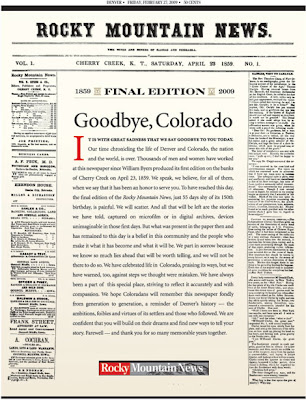
Like many people with ties to Colorado and the Metro Denver Area, over the last week or so I have been thinking about what the demise of
The Rocky Mountain News means.
Clearly the elimination of jobs and economic activity is very painful particularly given the overall state of the economy. The broad civic loss of an independent and vigorous source of regional news will be felt immediately and for coming decades. The break in 150 years of historical continuity is like a sharp knife to Denver's soul.
As a blogger living in the New York City area but writing about economic development in Denver,
The Rocky provided a tremendous news source for me, sparking and informing many of my blog posts (best wishes in future endeavors Rebchook, Milstead, Reuteman and team). Ironically the very same Internet which made my blogging possible, led to structural economic changes which are contributing to the loss of so many newspapers, including
The Rocky, around the country.
One of the things which makes the City of Denver and the surrounding area so special is its status as a regional metropole -- a political, cultural, economic and financial capital for the intermountain western United States. The newspapers' very name - "
The Rocky Mountain News" was emblematic of Denver's claim to regional supremacy.
The Rocky's presence along with
The Denver Post brought prestige to Denver making it, by my reckoning, the smallest of the remaining two newspaper towns in America. For many decades the two papers fought a legendary news war providing competing perspectives, promotional prices, spurring each other on to journalistic achievements, and helping to inform and entertain the citizenry. When a truce was called in 2001 and the two papers signed a joint operating agreement and combined their business operations, they still maintained separate newsrooms and editorial views.
Denver, the United States and most places around the world are going through a very serve economic downturn which is destroying well-loved institutions and traditions, dislocating millions of people and enveloping many facets of peoples lives with painful uncertainty. However, with this type of crisis comes changes and the seeds of new opportunity. Its hard to know exactly how and when that opportunity will unfold but I am hopeful that the Denver Region is well positioned to embrace the changes and ultimately thrive in the new reality -- its just a darn shame that
The Rocky won't be around to keep us informed along the way.
 The current recession and the resulting fall in energy prices have slowed the development of the Renewable Range's green energy economy. Despite the fact that the economy (and weather) is really cold today, Spring is coming and there are a few green sprouts appearing.
The current recession and the resulting fall in energy prices have slowed the development of the Renewable Range's green energy economy. Despite the fact that the economy (and weather) is really cold today, Spring is coming and there are a few green sprouts appearing.



